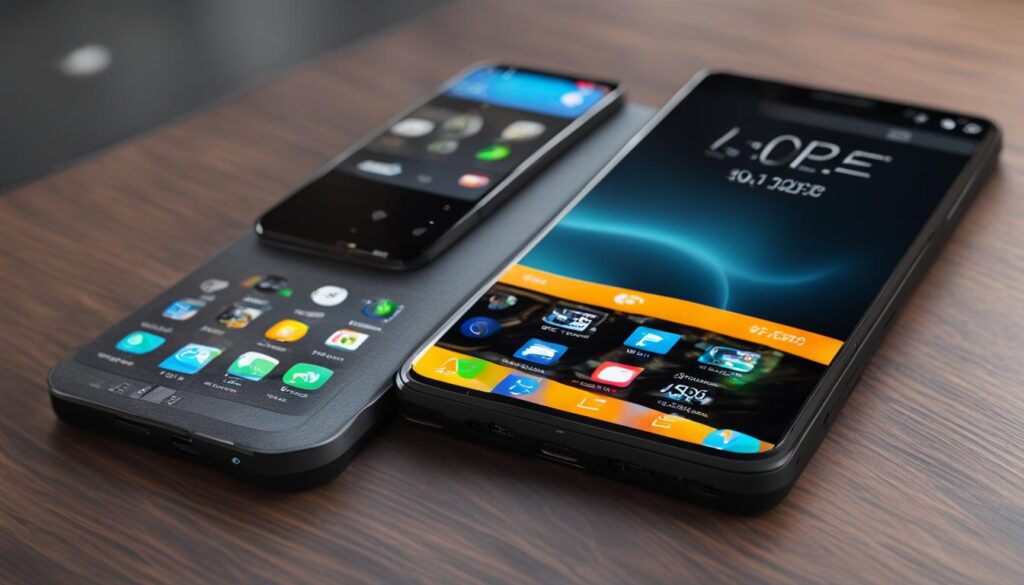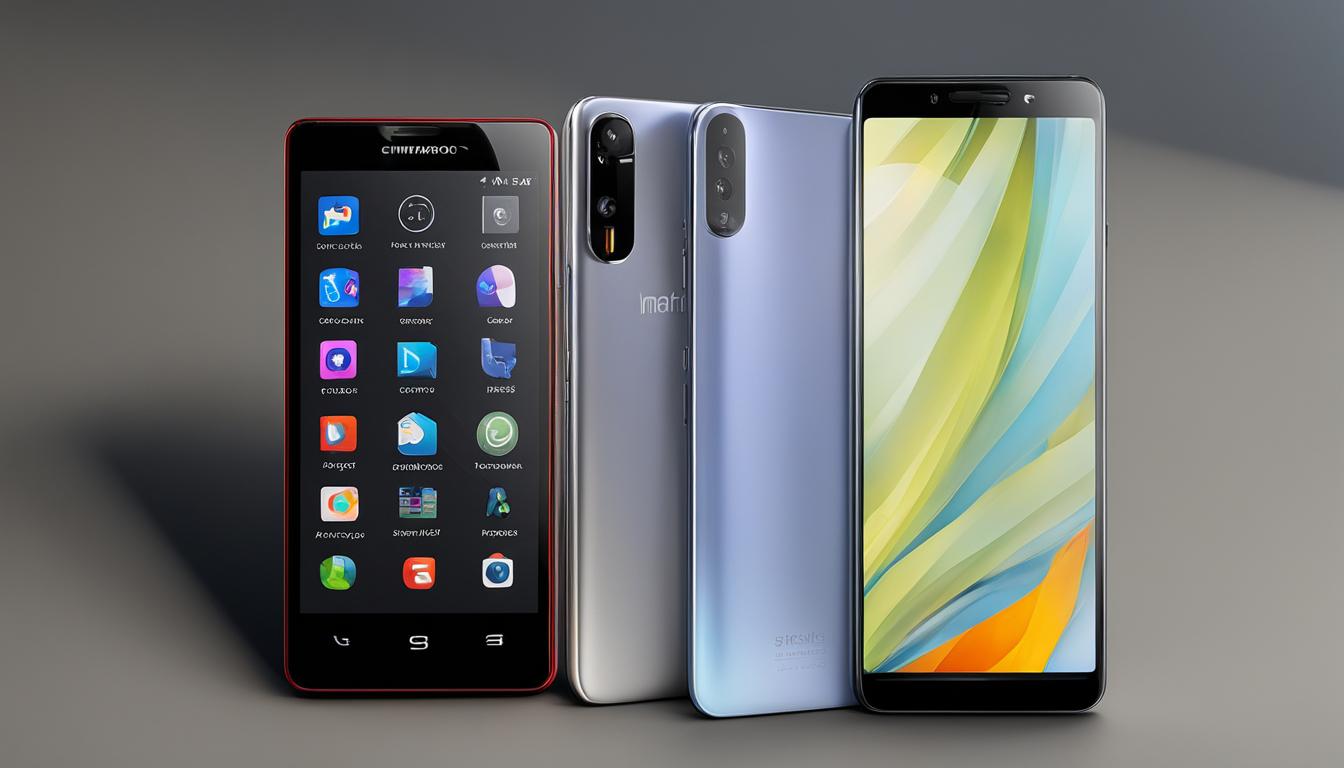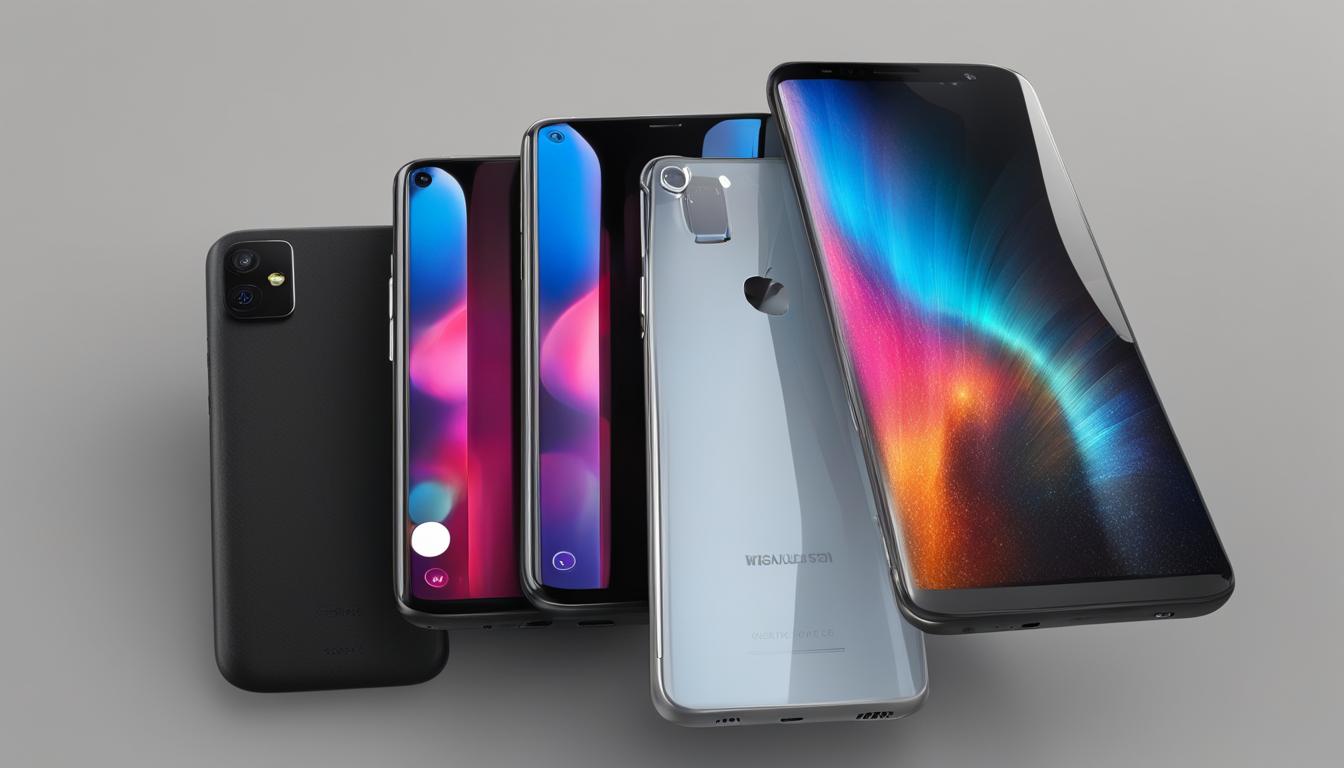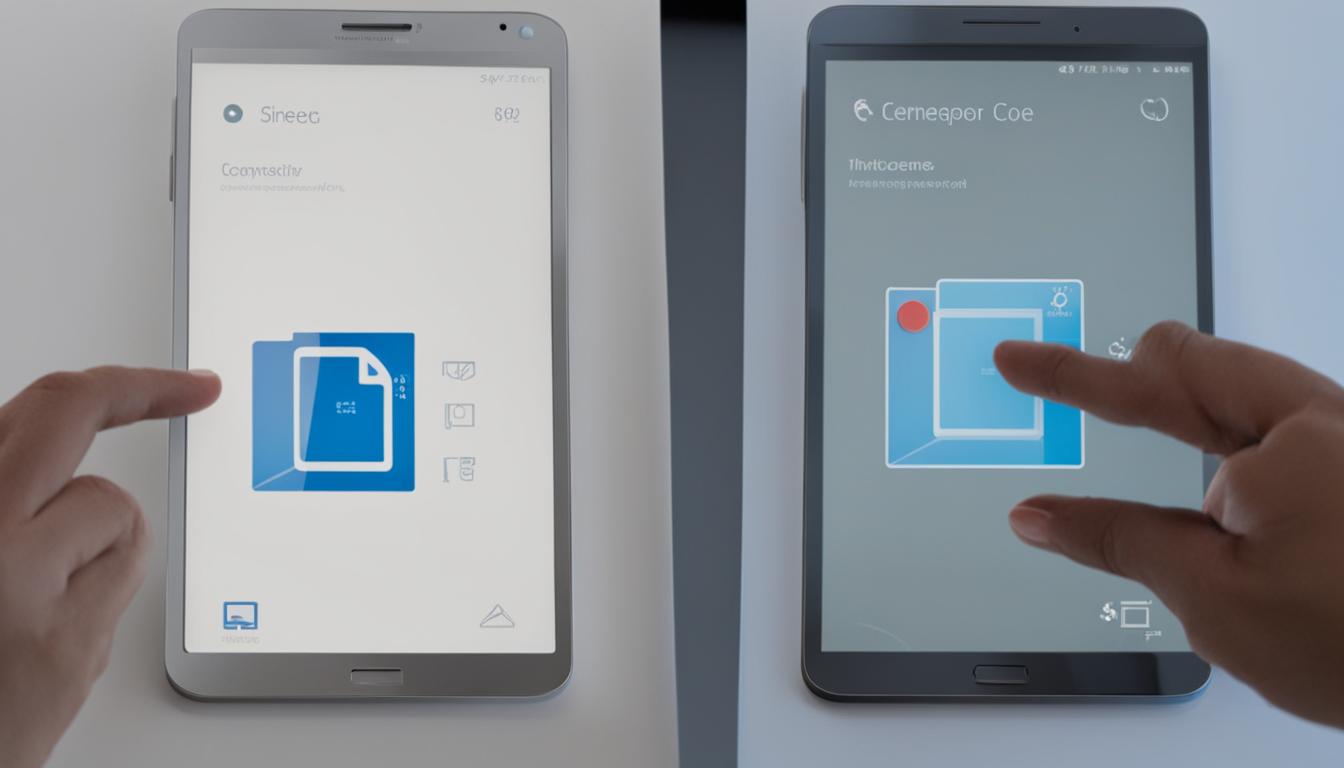Welcome to our article exploring the differences between smartphones and feature phones. In today’s fast-paced digital world, it’s essential to understand the unique characteristics that make smartphones stand out from their feature phone counterparts.
A feature phone, with its traditional form factor and simple user interface, offers limited functions compared to a smartphone. On the other hand, smartphones are more than just phones – they are powerful devices that integrate communication, internet access, and a wide range of advanced features in one sophisticated package.
Key Takeaways:
- Smartphones have advanced features like internet capabilities, mobile apps, and touchscreen interfaces.
- Feature phones retain the form factor of older mobile phones and have limited functions.
- Smartphones offer enhanced communication, productivity, and access to a variety of apps and services.
- Feature phones are often used in niche markets, while smartphones are widely adopted in both personal and business settings.
- Advancements in technology continue to shape the future of smartphones, addressing challenges and limitations along the way.
Functions and Capabilities of Feature Phones
A feature phone, also known as a basic phone or a dumb phone, is a mobile phone that has limited functions compared to a smartphone. It retains the form factor of earlier generations of mobile phones and is often used by individuals who value affordability, durability, and simplicity. Despite its simplicity, feature phones still offer a range of functions that cater to different needs and preferences.
Key Features of Feature Phones
1. Internet capabilities: While feature phones may not have the full browsing experience of smartphones, they often provide basic internet access for activities like checking emails, browsing news websites, or using social media platforms that have mobile versions.
2. Mobile games: Many feature phones come preloaded with simple games that can provide entertainment and help pass the time. These games often have low graphics requirements, making them suitable for feature phone hardware.
3. FM radio: A popular feature of feature phones is the built-in FM radio receiver. This allows users to listen to their favorite radio stations without the need for an internet connection or additional accessories.
4. Flashlight: Feature phones often have a built-in flashlight functionality, providing a convenient source of light in emergency situations or when navigating in the dark.
5. Niche market functionality: Some feature phones are designed for specific purposes, such as phones for the elderly with larger buttons and simplified interfaces, or religious phones with built-in religious texts and prayer reminders.
While feature phones may not offer the advanced capabilities and versatility of smartphones, these devices still serve a purpose in today’s mobile landscape. They are reliable, affordable, and offer essential functions for those who prefer a simpler mobile experience.
| Function | Description |
|---|---|
| Internet capabilities | Basic internet access for emails, news, and social media |
| Mobile games | Preloaded games for entertainment |
| FM radio | Built-in radio receiver for listening to favorite stations |
| Flashlight | Convenient source of light in dark or emergency situations |
| Niche market functionality | Phones designed for specific purposes like the elderly or religious use |
The functions and capabilities of feature phones may be limited, but they still cater to the needs of certain individuals and niche markets. Whether it’s providing basic internet access, entertainment through games, or essential features like an FM radio and flashlight, feature phones offer simplicity and affordability in a mobile device.
In the next section, we will explore the evolution and rise of smartphones, their advanced features, and the importance of smartphones in the enterprise.
Evolution and Rise of Smartphones
In recent years, smartphones have undergone a remarkable evolution, transforming from basic communication devices to powerful, multifunctional tools that have become an indispensable part of our daily lives. The rise of smartphones can be attributed to several key factors, including advancements in technology, increased internet connectivity, and the growing demand for enhanced functionality.
Smartphones have come a long way since the advent of 3G networks. With the introduction of high-speed internet connectivity, users gained access to a wide range of advanced features and functionalities. Today, smartphones offer an array of capabilities that were unimaginable just a decade ago. From the ability to send emails and messages on the go, to social media access, health and wellness tracking, and mobile payment options, smartphones have become an integral part of modern life.
One of the defining features of smartphones is their support for third-party applications. Through app stores, users can download and run various software applications that cater to their specific needs and interests. This vast ecosystem of apps has opened up new possibilities, allowing individuals to customize their smartphones to suit their preferences and enhance their productivity.
| Smartphone Features and Functionalities | Benefits |
|---|---|
| Internet access and web browsing capabilities | Stay connected and access information on the go |
| Support for multiple email accounts | Efficiently manage personal and work emails in one device |
| Embedded memory | Store and access documents, photos, and media files |
| QWERTY keyboards | Effortlessly type out messages, emails, and documents |
| Wireless synchronization with other devices | Seamlessly share and sync data across multiple devices |
| Support for third-party applications | Expand the functionality of the smartphone with a wide range of apps |
| Multitasking capabilities | Efficiently switch between different apps and tasks |
| Touchscreen interfaces | Intuitive and user-friendly navigation |
As technology continues to advance, smartphones are expected to become even more powerful and versatile. From artificial intelligence and augmented reality to advancements in camera technology, the future of smartphones holds exciting possibilities. Smartphones have truly revolutionized the way we connect, communicate, and access information, and will continue to shape our future.
Importance of Smartphones in the Enterprise
Smartphones have become an indispensable tool in the modern enterprise, offering numerous advantages and benefits. Their advanced productivity features, integration with IT management tools, and enhanced security measures make them a valuable asset for businesses of all sizes. Here, we explore the various ways in which smartphones contribute to the success and efficiency of enterprise operations.
Increased Productivity
One of the key advantages of using a smartphone in the enterprise is the significant boost in productivity it provides. With a smartphone, employees can easily access work-related emails, calendars, and documents while on the go. This level of connectivity enables seamless collaboration and real-time decision-making, eliminating the need to be tied to a traditional office setup. Additionally, smartphones offer a wide range of business productivity apps that streamline tasks, manage projects, and improve overall efficiency.
Enhanced Communication and Collaboration
Smartphones revolutionize communication within an organization. Employees can make and receive calls, send instant messages, and participate in video conferences from anywhere at any time. This level of connectivity enhances collaboration among team members, regardless of their physical locations, fostering effective teamwork and reducing communication barriers. With a smartphone, employees can stay connected to colleagues, clients, and partners, ensuring seamless communication and smooth business operations.
Mobile Workforce Enablement
The portability and functionality of smartphones enable businesses to empower their employees with the ability to work remotely. With a smartphone, employees can access critical business applications, manage tasks, and respond to urgent requests even while away from the office. This flexibility not only improves work-life balance but also allows businesses to tap into a global talent pool and expand their operations beyond geographical boundaries.
| Advantages of Using a Smartphone in the Enterprise | Smartphone Benefits |
|---|---|
| Increased productivity through easy access to work-related emails, calendars, and documents on the go | Improved communication and collaboration among team members |
| Ability to work remotely and enable a mobile workforce | Streamlined business operations and enhanced efficiency |
| Seamless integration with IT management tools | Advanced security measures to protect sensitive business data |

By leveraging the advantages and benefits offered by smartphones, businesses can stay competitive in a rapidly evolving digital landscape. These devices have transformed the way enterprises operate, enabling organizations to maximize productivity, streamline communication, and foster innovation. As technology continues to advance, smartphones will continue to play a vital role in shaping the future of the enterprise.
Key Features and Benefits of Smartphones
Smartphones offer a range of innovative features that have revolutionized the way we connect, communicate, and access information. These advanced devices have become an essential part of our daily lives, providing numerous benefits and enhancing our productivity. Let’s explore some of the key features and benefits that make smartphones stand out in the mobile device market.
1. Internet Access and Web Browsing
One of the most prominent features of smartphones is their ability to provide internet access on the go. With a smartphone in hand, you have the world at your fingertips. Whether you need to check your emails, browse the web for information, or connect with friends and family on social media, smartphones make it all possible. The convenience of having constant access to the internet allows you to stay connected and informed wherever you are.
2. Access to a Wide Range of Apps and Services
A smartphone’s connection to an app store opens up a vast array of possibilities. You can download and install a wide range of software applications that cater to your specific needs and interests. Whether you’re looking for productivity tools, entertainment apps, fitness trackers, or games, the app store offers something for everyone. The availability of these apps and services enhances the functionality and versatility of smartphones, making them powerful tools for both work and play.
3. Enhanced Communication Options
Smartphones have revolutionized the way we communicate with others. In addition to traditional voice calls and text messaging, smartphones provide various communication options such as video calls, instant messaging apps, and social media platforms. These features allow for real-time, face-to-face conversations and quick, convenient messaging. With smartphones, distance is no longer a barrier to staying connected with loved ones or collaborating with colleagues.
4. Increased Productivity
Smartphones have become invaluable tools for boosting productivity. With built-in productivity apps and support for third-party applications, you can manage your tasks, organize your schedule, and collaborate with others seamlessly. The ability to access emails, edit documents, and perform work-related tasks on the go allows you to stay productive even when you’re away from your desk. Smartphones have transformed the way we work and have made multitasking easier than ever before.
In conclusion, smartphones offer a wide range of features and benefits that set them apart from other mobile devices. With their internet capabilities, access to apps and services, enhanced communication options, and increased productivity, smartphones have become indispensable in our modern lives. These powerful devices have transformed the way we interact with the world and have opened up countless opportunities for innovation and efficiency.
Challenges and Limitations of Smartphones
While smartphones offer a wide range of advanced features and capabilities, they do come with their fair share of challenges and limitations. These factors can impact the overall user experience and functionality of the device.
1. Overuse and Social Etiquette Issues
One of the challenges associated with smartphones is the issue of overuse and its impact on social interactions. With the constant access to apps, social media, and online content, it can be easy to become absorbed in the digital world, leading to reduced real-life social interactions. Additionally, the use of smartphones in social settings can lead to social etiquette issues such as distracted conversations or neglecting face-to-face interactions.
2. Battery Life Concerns
Battery life remains a limitation of smartphones, particularly with the increasing power demands of advanced features. Despite advancements in battery technology, heavy usage, prolonged screen time, and running multiple apps simultaneously can drain the battery quickly. This requires users to regularly charge their devices or carry portable charging solutions to ensure uninterrupted usage.
3. Health Issues and Security Vulnerabilities
Another challenge associated with smartphones is the potential health issues related to prolonged screen exposure or radio emissions. Extended periods of screen time can lead to eye strain, headaches, and disrupted sleep patterns. Additionally, smartphones are susceptible to security vulnerabilities, which can expose personal data and sensitive information to hackers and malicious actors.
Overall, while smartphones have enhanced our lives in numerous ways, it’s important to acknowledge and address these challenges and limitations to ensure a balanced and safe smartphone usage experience.
| Challenges | Solutions |
|---|---|
| Overuse and social etiquette issues | Set boundaries for smartphone usage, prioritize face-to-face interactions, and practice digital detoxification. |
| Battery life concerns | Optimize device settings, use power-saving modes, and carry portable charging solutions. |
| Health issues and security vulnerabilities | Take regular breaks from screen time, protect personal information with strong passwords and security measures. |
Conclusion
In conclusion, smartphones offer a multitude of functionalities and features that set them apart from feature phones. With their advanced capabilities, smartphones have revolutionized the way we connect, communicate, and access information.
Smartphones provide access to a wide range of apps and services, making them highly versatile tools for enhancing productivity and communication. They enable users to stay connected through various channels, such as social media, email, and messaging platforms.
While feature phones serve specific niche markets and have limited functionalities, smartphones have become an integral part of both personal and business life. They offer touchscreen interfaces, internet access, multitasking capabilities, and support for third-party applications, all in a portable and convenient form factor.
As technology continues to evolve, smartphones will continue to shape our future. The constant advancements in smartphone functionalities and features ensure that they remain at the forefront of innovation, providing us with limitless possibilities and enhancing our daily lives in numerous ways.
FAQ
What is the difference between a smartphone and a feature phone?
A feature phone retains the form factor of earlier generations of mobile phones and has limited functions compared to a smartphone. Smartphones have advanced features, such as internet capabilities, mobile apps, and a touchscreen interface.
What functions and capabilities do feature phones have?
Feature phones can provide functions including internet capabilities, mobile games, FM radio, and flashlight. They are often used in niche markets or by individuals who value affordability, durability, and simplicity.
How have smartphones evolved over time?
Smartphones have evolved from the advent of 3G networks, which allowed for increased bandwidth and advanced capabilities. They now offer features such as email and messaging, social media access, health and wellness tracking, connectivity with other devices, mobile payment options, and support for third-party applications.
Why are smartphones important in the enterprise?
Smartphones have gained popularity in the enterprise due to their advanced productivity features, integration with IT management tools, and improved security measures. They enable employees to perform work-related tasks, such as email, scheduling, and document editing, on the go.
What are the key features and benefits of smartphones?
Smartphones provide internet access, web browsing capabilities, support for multiple email accounts, embedded memory, QWERTY keyboards, wireless synchronization with other devices, support for third-party applications, multitasking capabilities, and touchscreen interfaces. The benefits include portability, access to a wide range of apps and services, enhanced communication options, and increased productivity.
What challenges and limitations do smartphones have?
Some challenges associated with smartphones include overuse and social etiquette issues, battery life concerns, potential health issues related to prolonged screen exposure or radio emissions, and security vulnerabilities. Software updates and device security measures also require attention.
 Skip to main content
Skip to main content


